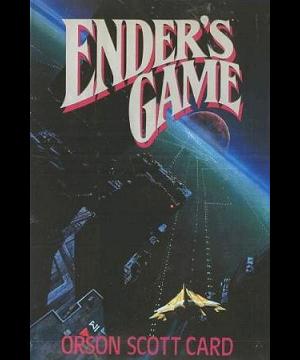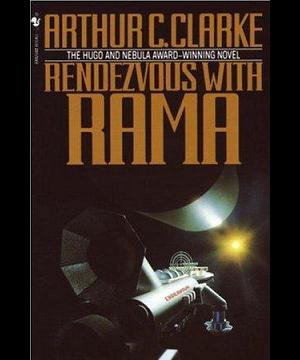Top 20 Greatest Science-Fiction Novels
As a science-fiction writer, it occurs to me that I don't write a whole lot about science-fiction. With that in mind, I decided to list the top science-fiction novels that have ever been published. I kept a one-book-per-author rule, but otherwise left the field open to anything, even novels that aren't traditionally recognized as sci-fi. I won't spend much time on numbers 20 through 11, but I will explain my top ten choices in more detail.
#4
Foundation
by Isaac Asimov
|  |
#4
Foundation
by Isaac Asimov
|  |
Sir Isaac Asimov is, without question, one of the top five most important science-fiction writers. He was the first modern writer to ever tackle the subject of artificial intelligence, and his ideas are still among the best and most successful on that subject. His robot books and short stories alone would secure his place in history, but it is his Foundation novels that put him this high on my list. The first novel begins in the distant future, where a man named Hari Seldon has unlocked a mathematical secret that allows him to accurately predict the future. He knows the knowledge is dangerous and how it will be used, so he creates an elaborate series of time locks that will display holographic messages at certain times for the next several centuries. Seldon knows that the future holds two possible outcomes, both of which include the inevitable fall of the current 12,000-year-old galactic Empire: either humanity will face 30,000 years of chaos and anarchy, or a new government known as Galaxia will emerge as a new and peaceful order after only 1,000 years, thanks to the Encyclopedia Galactica and Foundation that Seldon himself proposes. Foundation then chronicles several generations in the life of the Empire that follows Seldon's death. Each message is met with increasing fanfare and expectation after particularly harrowing emergencies of the day, and each message proves that humanity is still on the right track. The second book, Foundation and Empire, competed very heavily with the first book for this spot on my list, because the second book is where events begin to deviate from Seldon's predictions for reasons that are both fascinating and cool. Foundation, along with its first two sequels, is one of the most epic and thought-provoking science-fiction stories ever told, and in many respects, the trilogy is to sci-fi what Lord of the Rings is to fantasy.
#3
Contact
by Carl Sagan
|  |
#3
Contact
by Carl Sagan
|  |
While not primarily known for his fiction, Carl Sagan managed to write one of the most influential science-fiction novels of all time. Contact reads like a detailled thought experiment in which Sagan puts his vast knowledge and reasoning to the task of imagining what it would be like if we actually received an alien signal from space. The story leaves no stone unturned, as Sagan imagines how we would react, how world politics would change (the novel was written during the cold war, so there are more political implications in the book than in the movie based on it), and what the signal would be. He includes every major argument that has been made on this subject through a plethora of characters--each of whom represents a certain attitude--and the whole thing eventually becomes a very personal and poignant meditation on faith and skepticism. Contact is one of the deepest and most philosophical science-fiction novels ever written, and it is profound in ways that most stories are not. If your only exposure to this story is through the movie (which is a damn good movie), you owe it to yourself to read the book.
#2
Ender's Game
by Orson Scott Card
|  |
#2
Ender's Game
by Orson Scott Card
|  |
Ender's Game is a deceptively simple story about an incredibly young prodigious boy who holds the potential to save the entire human race from an alien threat. Unlike most sci-fi stories that deal with alien invaders, the looming threat of the story--the "buggers"--are unseen throughout the novel, only referenced occasionally. The story instead revolves around this impossibly young child who is put through intense training in order to prepare him for a life as a soldier against the buggers. He goes to an orbiting battle school, where he trains in zero-gravity combat and tactics while facing unfair challenges at every turn. There is more to the story, as the writer, Orson Scott Card, devotes several pages to the politics and social realities of the future. But it is the characters who truly shine--so much so that Card would later write several novels starring the novel's supporting cast--and the ending is absolutely jaw-dropping.
#1
Rendezvous With Rama
by Arthur C. Clarke
|  |
#1
Rendezvous With Rama
by Arthur C. Clarke
|  |
It's no secret that the late Sir Arthur C. Clarke is, in my opinion, the greatest science-fiction writer who has ever lived. He has written several classics that should be required reading for any fan of the genre, including Childhood's End, 2001: A Space Odyssey, Songs of Distant Earth, The Fountains of Paradise, and The City and the Stars, but nothing is as mind-bogglingly awesome as Rendezvous with Rama. The story involves an enormous, hollow alien spacecraft that approaches our solar system for reasons unknown, and the small crew who is sent to intercept it. The ship is the star of the novel, as its mysterious environment is explored with loving detail. Clarke is the master of hard science-fiction, because no detail is too insignificant to consider and every potential complication is addressed. Without spoiling the ending, the way the novel makes you feel after the last page is both satisfying and infuriatingly unsatisfying, leaving your imagination to run at an incredible pace. Clarke wrote a handful of sequels, most of them with the help of his long-time collaborator Gentry Lee, but none of them even come close to being the magnum opus that is Rendezvous with Rama. Also, as a side note--and I know I sound like a broken record--but they need to make this movie! If you could use the filmmaking technology that James Cameron has just made possible, a film version of Rama would be so incredible that it would break the minds of science-fiction fans everywhere.
-e. magill 3/16/2010
|
|